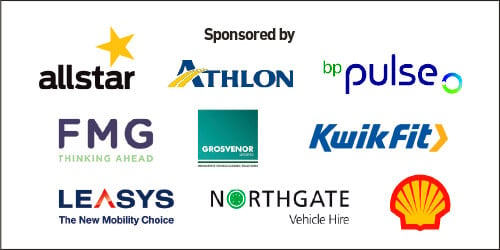This feature was taken from our special Leadership in fleet report. Click here to read it.

Predicting the future accurately is difficult: just five years ago very few expected fleet electrification to dominate agendas the way it is, while others thought many organisations would be replacing company cars in favour of mobility-as-a-service on a huge scale.
But regardless of these big-ticket changes, the fleet decision-makers’ role has changed in recent years and will continue to do so in the future.
“Since I started in fleet 15 years ago, the role has definitely evolved,” says Matt Hammond, head of fleet and plant at Altrad Services, who was named Fleet/Transport Manager of the Year at this year’s Fleet News Awards.
“Back then the role was predominantly about car lists, car choices and maintenance issues.
“Over time, the role has evolved to be more financially focused, understanding TCOs and fleet, efficiency together with great focus and strategies to manage risk and driver safety.”
Hammond says compliance has always been a key element of the role and this has stayed constant throughout.
However, now “knowing everything about cars or trucks is no longer enough,” he adds.
“It’s a really varied role now,” says Paul Hollick, chair at the Association of Fleet Professionals (AFP). “You have to be a negotiator – internally and externally, knowledgeable, a subject matter expert, deal with HR problems and leading transformation. Softer skills are definitely coming to the fore.
“We’ve also never been in more turbulent times in terms of the transition that we’re seeing at the moment, not just to electrification, but to alternative fuels, while technology is also changing.”
The evolving demands is also increasing diversity in the fleet decision-maker community: in 2018, the ICFM provided more training to women than to men.
“I think there’s a recognition that it’s a very male dominated industry; traditionally cars and vans are something a young boy, rather than a young girl, tends to be focusing on,” says Hollick.
“But there is definitely a sea change as we start to move to softer skill requirements and the recognition, not just within fleet but also in the boardroom, that you don’t need guys who understand how an engine works to run a fleet.
“In our industry, I don’t see any agenda other than getting the right person in with the right skills.”
Here we look at four key aspects a modern fleet manager should consider to ensure success in the future:
Leadership
The profile and importance of a dedicated fleet decision-maker has increased in importance in the eyes of a many boardrooms in recent years, as the need to control costs and decarbonise the fleet has risen up the agenda.
This means a modern fleet operator should develop leadership skills as in many cases they will be heading the transition.
“Fleet should be represented at board level so at least somebody is speaking up for fleet, particularly when it tends to be the number one or number two contributor of CO2 emissions of a business,” says Paul Hollick.
“This should be not just from a financial and a sustainability perspective, but also operational as well, to ensure the fleet can navigate the challenges and get to where it needs to be.
“Therefore we're trying to make sure that are we elevate standards across the fleet industry; it’s not just about technical standards now, it’s also about leadership standards.
“Sometimes fleet managers can feel a little bit more hamstrung through confidence and being a voice within their organisation, so we're working on softer skills now as well which will become equally as important.”
Improved relations with the board will also win help win buy-in for new initiatives, as well as set the right example for other staff to follow.
“If you get the support from the top down, people begin to follow,” says Mandy Vanstone, who was fleet and procurement manager at Miele when it was named Most Improved Fleet at this year’s Fleet News Awards.
“Our MD is hugely focused on driver safety and he’s been very supportive and genuinely interested in what we’re doing in fleet.
“We used to do driver training for our van drivers and now we do it for the car drivers as well, so when new people join us they get trained within the first month or two.
“Our MD went on the course and said to me ‘I don’t mind admitting, Mandy, I thought it was going to be a waste of money because I didn’t think I’d learn anything, but I came away from it having learned an awful lot’.”
Communication
Fleet decision-makers need to be able to communicate effectively with all colleagues, regardless of their status or seniority in their organisation.
“Throughout all of our training courses, we coach delegates about what it's like to walk in other people's shoes, so they know what it's like to be a finance person, what it's like to be an ops person, what it's like to be a CEO,” says Paul Hollick.
“With drivers, the old school carrot and stick approach to change has evolved more into ‘how do I transform my behaviours to be able to get them to what we need them to do?’.
“A lot of this is around explanation; people are more intelligent and used to dealing with data now.”
Many people, for example, use fitness trackers and their associated apps so are used to interpreting information they did not previously have access to.
M Group Services uses telematics to monitor driver behaviour, with its AI-enabled camera system combining to monitor data events such as distracted driving, handheld mobile phone usage, no seatbelt being worn, distance following behind another vehicle and smoking.
Its system generates a driver safety and eco-driving score, and is available for all relevant persons to view via a portal to establish trends an areas of focus.
Drivers are also given access via an app allowing them to check their performance and see if any events are recorded against them. They are also able to add comments.
“Literally, the driver can get to a safe place, go on to his app and see exactly what he's done. He's got a learning point,” says Tony Draper, head of safety, health, environment, quality (SHEQ) and road risk at M Group Services, which won the Excellence in Fleet Safety Compliance award at this year’s Fleet News Awards.
As well as apps, the way fleet decision-makers communicate with drivers has changed, partly due to the emergence of new technologies, while the Covid-19 pandemic has led to many fleet managers working more at home than on site.
Miele, for example, has set up an MS Teams channel for fleet and this contains huge amounts of resources for drivers and their managers.
The fleet department also sends out regular information from the National Highways Driving for Better Business van driver toolkit, focusing on topics such as mental well-being. Miele also has its own landing page on the DfBB website.
“Our Teams channel is really invaluable. It’s a good reference point for our regional service managers to go to,” says Miele’s Mandy Vanstone.
“We also like to share information with colleagues. The line managers, our MD and finance director know the cost savings we’re achieving through the work we’re doing on reducing accidents, but the people on the ground driving don’t necessarily know that.
“Explaining this to them helps them buy-in to what we’re doing.”
Strategic planning
“If you’re a fleet manager and you’re in the trenches with your particular topics it’s difficult to start thinking about what’s likely needed in four or five years’ time,” says PaulHollick.
“But you still need strategic and long-term thinking; fleet is a seven-, eight-year plan. The best fleet managers I've seen look at their fleet over a long period of time, not just worrying about cost today.
“When I joined the fleet industry, a fleet manager would get their budget, which would be a percentage of what it was the previous year.
“Now it needs to be far more progressive and, working with the finance community within the organisation and the business as a whole, thinking about four-, five- or seven-year cycles.
“The 2030 has forced a lot of fleet managers to think like that anyway which, in some respects, is quite healthy.”
Planning ahead means fleet decision-makers need to be aware of industry trends, upcoming legislation and new products as well as network with their peers.
This can be done through attending events such as Fleet & Mobility Live or Fleet 200, reading fleetnews.co.uk, signing up for the Fleet News newsletters, as well as becoming involved in industry bodies such as AFP and Logistics UK, and talking to suppliers.
Upskilling
Undergoing training is an obvious way to improve fleet management skills, with providers including industry bodies such as FORS and AFP.
The latter has seen a dramatic rise in the amount of training delivered so far this year, with the number of training days sold to the beginning of August surpassing 2022’s total.
Paul Hollick says the increase reflects several trends including higher interest in formal training among fleet industry professionals and a general post-pandemic move across the workforce to enhance levels of qualification.
“During 2021 and 2022, we saw a definite increase in fleet managers looking to upskill to meet current and future fleet challenges such as electrification, so we increased our potential capacity for places this year by 85% - a decision which has been vindicated by a dramatic increase in training days and also delegates, which is very pleasing to see,” he adds.
AFP courses include Fleet Vehicle Management Introductory, Fleet Vehicle Management Strategic, Fleet Vehicle Management Advanced, Accelerate – Women’s Voices in Fleet, and two EV courses: Making the Switch to EVs and Transition to eLCV.
Case study: How an award-winning fleet manager thinks the role will evolve
Fleet News: How do you expect the fleet decision-maker’s role to evolve?
Matt Hammond, head of fleet and plant at Altrad Services who was named Fleet/Transport Manager of the Year at this year’s Fleet News Awards: The biggest change I have seen, and continue to see, is the focus on carbon. Fleets were always conscious of reducing the CO2 caps of company car lists but the drive to zero has definitely changed the landscape and how the entire fleet is evaluated, assessed and procured.
This drive to zero will only continue as the Government deadlines get closer. The interesting thing is how fleets will achieve this.
With differing opinions and technologies across the industry, it is still very much a moving target that all fleet managers are having to deal with.
Fleet News: What do you consider the most important skills to be for a modern fleet manager?
Matt Hammond: Versatility. Knowing everything about cars or trucks is no longer enough. Today’s fleet manager needs to understand the impact on the wider business or decisions they make today.
Carbon costs, Scope 1 and 2 emissions, wholelife costing models, future decarbonisation strategies, electrification cost recoveries: all these areas are now front and centre of every fleet manager and business across the UK.
Understanding the supply market and where manufacturers are in their transition strategy and how this fits with your own.
Of course, fleet managers need to also remember the core principles of fleet, ensuring governance and compliance is maintained, safe vehicles and driver safety and wellbeing continues to dominate the role.
Fleet News: What are the most important things a fleet decision-maker should do to ensure they are fit for the future?
Matt Hammond: At this time in fleet, the most important thing a fleet manager can do is talk and listen. Nobody has all the answers to the new world of net zero fleets despite what the press might portray.
Talk to your peers, talk to the industry bodies, get involved in roundtable discussions. Everybody is at a different stage in this journey and your experience could help others and vice versa.
Also, don’t feel pressured to act if it is not right for your business. 2030 might feel close, but its not a cliff edge, so operate within a timeline that works for your business.
That said, the most important thing a fleet manager should do is enjoy this period of time. We have not seen such a change in the automotive industry for 100 years and what fleets and the industry do over the next 10 years will shape the landscape for generations to come, so embrace, enjoy and be open to suggestions.
As the role of fleet decision-maker (FDM) grows ever more complex, leadership is becoming a crucial quality.
Today's successful FDMs need to lead their teams, their drivers and their key stakeholders through a multifarious range of topics, from energy management to electric vehicles (EVs), and supply chain management to automated technology.
They need to be at the forefront of industry developments to guide their company and ensure the fleet meets the business needs in the most efficient and effective way.
Professional fleet leaders have the ability to implement policies successfully, adapting to an ever-changing environment.
They experiment and are first in line to trial new initiatives. They communicate clearly and often with those around them, helping to get buy-in to new ideas.
People leadership has risen up the list of priorities thanks to the greater focus on staff wellbeing, whether that's within fleet teams themselves or among the driving workforce.
The need to transition to EVs has opened the floodgates to a new vocabulary on workplace charging infrastructure (kW, resistors, cabling, capacity overload..), plus the creation of new relationships with the distribution network operators that would have been unheard of just three or four years ago. In each case, leadership is vital.
In this special Leadership in fleet report, we look at some of the areas having the greatest effect on the way fleets operate, offering advice and insight to give FDMs the confidence to make the right decisions and form best strategies.






















Login to comment
Comments
No comments have been made yet.